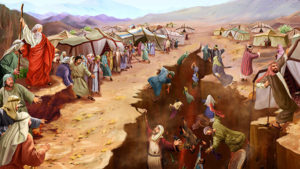Koirach 2017 – Cary, NC, Danbury, CT & The RBSO’s Patience
by devadmin | June 22, 2017 6:10 pm
Cary, North Carolina, Danbury, CT & The RBSO’s Patience
Where to begin? With a comment from Jeff which was supposed to be posted last week but was at the last minute left out because the Oisvorfer’s otherwise reliable webmaster posted the review while on the road and forgot? Or, with mazel tov wishes to a friend who celebrated his bar mitzvah two shabbosim back but 32 years late? Shoin, let’s instead begin with mazel tov wishes to two young men we have known since grade school; one got married this past week, the other, next week. Jeff’s comment and Oisvorfer response are found after the shout outs.
 A big mazel tov to Yair Isaacs, whom we know since childhood, and whom we watched grow up and blossom into the fine young man he is today, upon his wedding this past Sunday to Jennifer Schenkler. Yair is the son of our friends Doba and Kalman Isaacs and Jennifer is the daughter of Joni Feller Schenkler. A heartfelt mazel tov to the extended Isaacs and Treitel families and special mazel tov wishes to Doba’s mom, and bubby, Miriam Treitel. May Yair and Jennifer merit to enjoy many decades of blissful marriage.
A big mazel tov to Yair Isaacs, whom we know since childhood, and whom we watched grow up and blossom into the fine young man he is today, upon his wedding this past Sunday to Jennifer Schenkler. Yair is the son of our friends Doba and Kalman Isaacs and Jennifer is the daughter of Joni Feller Schenkler. A heartfelt mazel tov to the extended Isaacs and Treitel families and special mazel tov wishes to Doba’s mom, and bubby, Miriam Treitel. May Yair and Jennifer merit to enjoy many decades of blissful marriage.
 Mazel tov to Shmuel Wagner, future talmid chochom and son of our friends Tammy and Stephen (himself a talmid chochom) Wagner, upon his aufruf this coming shabbis, and his wedding (next Tuesday IM’H) to Soochi Heiderman, she the daughter of Caren and Alan Heiderman. We know Shmuel who spent many a shabbis afternoon and other times in our backyard quite well and wish him and his kallah only good and happy times together. Mazel tov to both extended families. For the women planning on getting their hair done for the simcha, as is the minhag in the Five Towns and mistama other places, be forewarned: Wagner weddings have been known to feature outdoor chupas; aroisgivorfina gelt!
Mazel tov to Shmuel Wagner, future talmid chochom and son of our friends Tammy and Stephen (himself a talmid chochom) Wagner, upon his aufruf this coming shabbis, and his wedding (next Tuesday IM’H) to Soochi Heiderman, she the daughter of Caren and Alan Heiderman. We know Shmuel who spent many a shabbis afternoon and other times in our backyard quite well and wish him and his kallah only good and happy times together. Mazel tov to both extended families. For the women planning on getting their hair done for the simcha, as is the minhag in the Five Towns and mistama other places, be forewarned: Wagner weddings have been known to feature outdoor chupas; aroisgivorfina gelt!
Just over one year ago, the Oisvorfer met the acquaintance of a fellow named Vladimir Katz. Vlad’s parents emigrated to the United States in 1979 and settled in Boro Park. Avada that piqued the Oisvorfer interests who, as many readers know, also grew up there, and back then, knew every street, every store, and for a while, kimat every person. As it turns out, Vlad’s father, OBM, used to own a candy store, the very one that years earlier was frequented quite often -almost daily- by the then quite young and future Oisvorfer. The store was located but yards away from the ‘F’ train at the corner of Dahill Road and Ditmas Avenue. That train, formerly known as the ‘T’ train took the Oisvorfer wherever; all journeys out of Boro Park, especially trips to Coney Island began at that station. It was at that station that the entire family squeezed very tightly together to get through the wedge-like turnstyle. As an aside, that candy store was eventually purchased and became a kosher luncheonette which it remains until today. I was fascinated when Vlad recounted how his father had been held up at gunpoint, and how, while feigning to be taking money out of the register at the demand of the hoodlum -who had already been handed some but wanted more- and with a gun pointing right at him, drew his own, and shot the robber. Loaded with lead, he stumbled backwards out of the store, fell down and was quickly helped into the waiting getaway van which then drove the injured thief over to the hospital where he expired. Good riddance! His accomplices were arrested while at the hospital. Vlad’s father made the news. Chalk one up for the good guys. Vlad was placed into a yeshiva (Ohel Moshe) but after a year of that torture, ran away. Without background, knowing nothing at all about Judaism, the yeshiva world was not for him. He was all of either nine or ten, he does not recall. Other than what was being taught in yeshiva, he had no other background. In fact he never had a bar-mitzvah.
Two shabbosim back, on shabbis Parshas Bihaloischo, the shul in Danbury where Vlad is a member in good standing, hosted a celebration in honor of his bar mitzvah. Here then, his remarks.
“Thank you Yitz, for endorsing and nudging me to have my bar mitzvah. I probably would never have a bar mitzvah if it were not for you! Thank you Lyle for helping me with my blessings and my speech. Thanks to David for all that you have taught me over the past months. And a special thank you to Sammy for leading the services and working tirelessly on behalf of the Jewish community of Danbury.
When I was about seven years old, living in the Soviet Union, I had a friend my age who told me about some bad people living in the downstairs apartment. Armed with this intriguing gossip, I told my mother. She asked, “who are these bad people?” And I said “they are Jews.” Surprised, my mother told me that I’m Jewish. It was my turn to be surprised. How can it be? I am not a bad boy! “Sasha Stikin is Jewish!” I told her that Sasha Stikin was a trouble-maker in my class, who by the way, was very Russian, not Jewish. So I tried saying that he must be Jewish, not me! And this is how I learned about my heritage.
Here in America, Jewish children learn about themselves through celebrations of Judaism with songs, holidays, Hanukah gelt, Purim costumes, and Pesach seders, with Jewish family and friends. But many children in the Soviet Union learn about being Jewish like one finds out he has an incurable, chronic medical condition that should not be revealed to anyone.
In the Soviet Union (back then) if someone said that you are not Jewish, it was a compliment. And if you happened to be Jewish, it was polite to say, “at least you don’t look Jewish.” Anti-Semitism was systemic and entrenched in almost every institution. Is it any wonder that parents did not teach their children to celebrate Judaism, to learn the Torah, to be good Jews?
Some may scoff at the idea of getting bar mitzvaed 32 years after my 13th birthday. But there is a parallel with this week’s parsha. The parsha speaks about partaking of the Passover offering in its ‘proper time’. But there was a group of Jews who were ritually impure; they could not participate in the Passover offering. So, Moses, at God’s directive, allowed them to have a second Passover a month later, a second chance. And so here I stand before you, and before God, with my second chance. As in this week’s parsha of Beha’lotekah which means when you kindle or light the candelabrum, which was performed by the kohanim or the high priests, I, a kohen, descendant of the high priests, am getting enlightened as well. The word aliya, which means to go up, shares the same etymology as the name of this week’s parsha. I aliya; I go up to the Torah, I rise up, I am enlightened.
Today I am legally obligated to fulfill the 613 mitzvos. I can be legally punished for violating the commandments. Because Jews are responsible for other Jews, I am lifting the burden from some of my fellow Jews by being more sensitive to Jewish law. And I hope to be a better Jew. Better late than never. Thank you again.”
Shoin: last week, closet reader Jeff who stated emphatically not once but twice that he was not a fan of the Oisvorfer, sent in the following comment:
Dear Ruv
First of all let me admit I have not been a fan of yours and over the years have seen your Torah printouts in our shul here, eventually admittedly started peeking in. Most of the time I don’t agree with your brash style and yet have to give credit where credit is due. You got a lot of readers here in these parts though again I’m not one of them.
I know you will not agree but how the hell can you continue to write about the logic and some sort of divine reasoning when each and every parsha is filled with contradictions and nothing truly makes sense. Just last week Moses is questioning G-d on how he can possibly deliver enough meat for all the people there in the desert. And G-d says is my hand limited?!! Correct. After all that Moses had seen he is questioning whether or not G-d can do what he promises and that’s ok?!!
Then Moses tells the spies to go and see if the land is good. So they come back and tell him what they saw, the truth, which is what he asked them to do. In return they get killed and the whole nation is doomed for destruction and walking around the desert for 40 years… nothing really makes sense. And of course you will find a way to justify that somehow G-d was right to be angry at them and threaten to destroy everyone. Looking forward to your take on the parsha.
Jeff
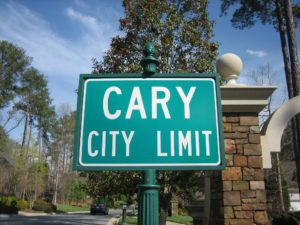 Jeff: fan, schman: the bottom line is that you are reading -at least at times- the Oisvorfer’s parsha review and that’s more than can be said of at least a few close friends. Shoin! The Oisvorfer gladly, and with a dash of humility, accepts the credit you do give him, albeit grudgingly. Who knew the Oisvorfer had readers and “a lot of them” as you state, all the way in Cary, North Carolina? Are there Jews out there? And where the hec is Cary, North Carolina? Mamish gishmak. As to your question on how Moishe, after being the RBSO’s miracle messenger, could question His abilities, and by extension, how the Yiddin of that generation could behave so poorly and continuously through their insolence challenge the RBSO, the following is offered for your consideration.
Jeff: fan, schman: the bottom line is that you are reading -at least at times- the Oisvorfer’s parsha review and that’s more than can be said of at least a few close friends. Shoin! The Oisvorfer gladly, and with a dash of humility, accepts the credit you do give him, albeit grudgingly. Who knew the Oisvorfer had readers and “a lot of them” as you state, all the way in Cary, North Carolina? Are there Jews out there? And where the hec is Cary, North Carolina? Mamish gishmak. As to your question on how Moishe, after being the RBSO’s miracle messenger, could question His abilities, and by extension, how the Yiddin of that generation could behave so poorly and continuously through their insolence challenge the RBSO, the following is offered for your consideration.
The history of the Yiddin while sojourning through the midbar, which includes a number of incidents which are quite ugly and speak to your question, is what makes the heylige Toirah so real. Is there another religion that so openly discusses the forging of a nation through their foibles? The heylige Toirah takes you inside their mindsets at that time in history. Here they were in a desolate midbar, in but their second year out of slavery where they had been conditioned for over 210 years, where they had no doubt become more than assimilated into Egyptian culture, and you expect perfect behavior? Let’s not forget: these people were for generations, dispirited and downtrodden. Yes, they were uplifted by miracles and at times -not enough– on their best behavior. Ober, given their collective states of mind -fragile mamish- they needed to see them daily. Absent of daily miracles, they quickly resorted back to their now entrenched factory setting: slave mentality. And for that reason, the RBSO determined them not be Promised Land worthy. The miraglim were but -in the Oisvorfer’s view- the foils; role players to execute what the RBSO already had in mind. The land was to be occupied by a generation that would be more self-sufficient with the RBSO avada in the background. Moishe too was but human. Dedicated for sure -the RBSO’s servant- but tired at times of their chicanery and mischievous behavior. Though frustrated at times, and though he lost his temper on at least one occasion, he did go to bat for their survival several times and certainly on the four or five occasions where the RBSO had thoughts of total annihilation. He did so following the eygel caper and again in parshas Shelach. He wasn’t done.
Still, and efsher because he wavered at times, in the end, he too was included, as was his brother Aharoin and sister Miriam in the decree: none would have their visas stamped; all three were doomed to die in the midbar. We will be reading of these events beginning next week. The RBSO, in these parshas which you call confusing, is merely giving us an inside view. Because He taka delivered on His promise of redemption and showed them miracle after miracle, left, from time to time, to their own devices, they were in the end still lacking the faith He wanted of the generation that would inherit and work the land. It was all, chaver Jeff, part of the master plan. Your job is to have absolute faith; the rest will fall into place. Not always necessarily when you want it to, or how, but it will; hang in there!
Shoin, between the bar mitzvah intro and speech, the shout outs to the Isaacs and Wagners, we are already on page 4. Ober, what about the parsha? Nu, here it is, ober for full disclosure: this week’s review is a copy -verbatim mamish- of what was written in 2014. Hey, guess what? The heylige Toirah, the one written by Moishe with some help from either Yihoishua or the RBSO Himself, ver veyst, was written in the year 2488 and you’re still reading it today, over three thousand years later in 5777. It won’t kill you to read a repeat written but three years ago. Here we go.
Welcome to Parshas Koirach where the Yiddin are seemingly still not ready for prime time. Seemingly there are still too many of them and this week the RBSO will continue thinning out the population. In our parsha, nearly 15,000 Yiddin will die in a variety of ways. Koirach and his wife but not his kids, his cohorts and later in the parsha another 14,000 will go. That’s the bad news. The good news? The medrish quoting the heylige Gemora has the story of how another decent wife saved the life of her husband. We have previously covered the curious case of Oin ben Peles, but if you are first time readers of the Oisvorfer’s weekly parsha review- shame on you- click here www.oisvorfer.com and check out the archives to this parsha for some givaldige details of just how Mrs. Peles saved her husband’s life. In short, she did it with 3 words: “are you crazy’? And ever since, women all over the world, have taken this phrase and turned it from a question to a statement when referring to their husbands. This week, Moishe is under attack as is his administration. And who else to lead the attack but a member of the mishpocho, a model copied by generations ad ahayoim hazeh (until today), especially if there’s money involved. Nu, azoy-geyt-iz (that’s how it goes.)
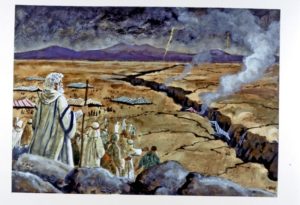 Was Mitzrayim (Egypt) the land of milk and honey? Soon we’ll address that ober ershtens (firstly), let’s say hello to two Toirah characters we might have first encountered back in parshas Shemois. Back then, they went unnamed, this week they are exposed. Let’s give a quick shout out to Doson (Dathan in the movies) and Aviram, the dynamic duo set of troublemakers who, according to some, popped up in Shemois, several times since, again in the midbar when they disobeyed the Munn collection rules, and are the main protagonists, along with Koirach, here in a parsha named after the scoundrel. The bottom line on them: they were bad guys, and this week the RBSO will finally dispose of them.
Was Mitzrayim (Egypt) the land of milk and honey? Soon we’ll address that ober ershtens (firstly), let’s say hello to two Toirah characters we might have first encountered back in parshas Shemois. Back then, they went unnamed, this week they are exposed. Let’s give a quick shout out to Doson (Dathan in the movies) and Aviram, the dynamic duo set of troublemakers who, according to some, popped up in Shemois, several times since, again in the midbar when they disobeyed the Munn collection rules, and are the main protagonists, along with Koirach, here in a parsha named after the scoundrel. The bottom line on them: they were bad guys, and this week the RBSO will finally dispose of them.
Ober if they were taka as giferlich as Rashi, the Medrish and others would have us believe, efsher you’re wondering why it took the RBSO all this time to eliminate these two characters? You are not alone! Doesn’t the RBSO typically deal with rabble-rousers instantly? Indeed He does! And it so happens that kimat all who dare antagonize Him are quickly eliminated. Weren’t the eygel participants gone in a flash? Just last week we met the mikoishesh-eytzim, the poor fellow who was doing something improper with his wood, if you chap. He was nebech dead a few pisukim later. A few weeks back we met the mikallel (blasphemer) who angered the RBSO. As aside, he was a blood relative, according to some, of Shulamis bas Divri, about whom we will shortly be reading; halt kup. A few pisukim later in the narrative he too met an untimely and instant death. Bad guys don’t typically make it out of the parsha. The RBSO didn’t like two of Reuvain’s son’s; seemingly, instead of seeding Tamar, they were acting like high school boys, if you chap. They too were gone in but a few pisukim. Ober these two guys, Doson and Aviram, despite their long records, as we will soon read, seemed to have had good staying power. If the medroshim are correct, they were seemingly already senior citizens by the time the Koirach episode unfolded. What’s taka pshat? If they were taka the bad guys Rashi and others ascribe all this mischief to, why did they merit such long life? Did the RBSO treat them more favorably than others? Were they needed for their appearance in the film version of The Ten Commandments?
Ober before we answer that question, and that makes two that are now open – the first about Mitzrayim being the land of milk and honey – mistama you long forgot who Doson and Aviram were. Nu, lommer chazerim (let’s review), why not? We were first introduced to them following the incident where Moishe killed a Mitzri. That, after the minuvil raped a nice Jewish woman who some say was Shulamis bas Divri. Bikitzur (in short), Doson and Aviram witnessed Moishe slaying and then laying the guy to rest, threatened to, and in fact did rat Moishe out to Paroy (Pharaoh). The misira (being ratted out) set off an entire chain of events including Moishe fleeing to either Midyan or Kush or both, getting married to either Tzipoirah or some tinkele mydel (kushite) or both and becoming a King for 40 years, or not, over Kush before his encounter with the RBSO at the burning bush.
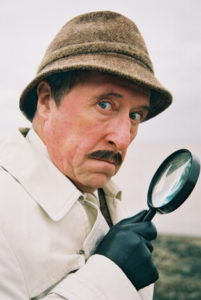 Wow, a mouthful mamish ober does the heylige Toirah tell us that someone got raped? Of course not! Ober the heylige Toirah, as you’ve been told in the past has lacunas in the narrative. What’s a lacuna? Zicher not a word the Oisvorfer learned in yeshiva. A lacuna is, according to Merriam Webster, a blank space or missing part; let’s call it a hole. What to do when one encounters a hole? Not what you think, chazir that you are. We are to look at Rashi, the heylige Gemora or the Medrish or others; they loved filing holes and they came up with a mamish givaldige story. Halt kup (pay attention) as we listen to how mamish gishmak the medrish and others were and how they wove together the storyline of Doson and Aviram. Inspector Clouseau would have been proud.
Wow, a mouthful mamish ober does the heylige Toirah tell us that someone got raped? Of course not! Ober the heylige Toirah, as you’ve been told in the past has lacunas in the narrative. What’s a lacuna? Zicher not a word the Oisvorfer learned in yeshiva. A lacuna is, according to Merriam Webster, a blank space or missing part; let’s call it a hole. What to do when one encounters a hole? Not what you think, chazir that you are. We are to look at Rashi, the heylige Gemora or the Medrish or others; they loved filing holes and they came up with a mamish givaldige story. Halt kup (pay attention) as we listen to how mamish gishmak the medrish and others were and how they wove together the storyline of Doson and Aviram. Inspector Clouseau would have been proud.
Nu, it all started when the Yiddin were nebech enslaved in Mitzrayim. Shoin, one fine evening, one of the Mitzri guards laid eyes on Shulamis Bas Divri ober she had something that could knock his eyes out; a husband. What to do? Shoin, the Mitzri chazir summoned the husband to work the night shift; Shulamis was left alone in bed. The farbrecher snuck in, she seemingly didn’t know (lights-out), laid himself on her and had his way with Shulamis. Which eishes chayil cannot tell the difference between her husband and a well-built goy, ver veyst. Shoin, he raped her. The husband returned, and epes sensed that something was wrong. He suspected the Mitzri, seemingly also confronted him and the Mitzri chazir beat the poor husband senselessly. Moishe came along, witnessed the beating, mistama chapped what had taken place and killed the Mitzri. And who should happen to be on the scene to witness the event? Says the medrish (Shemois Rabbah 1:29) as quoted by Rashi: the two guys were none other than Doson and Aviram who happen to have been in some argument of their own. Mistama one owed the other some money he promised to pay but didn’t, ver veyst. Seemingly, their argument was heading to fisticuffs when Moishe intervened and called one of them a Rosho (bad guy). Instead of a thank you, they got pissed off at Moishe, threatened to and then turned Moishe in. Nice to be ratted out by one’s brethren. Wait, the Medrish adds more color: Seemingly, the name of the man whose wife the Mitzri chazir had coveted (raped), and whose life Moishe had probably saved in the fight, was none other than Doson! Shoin, irony of ironies; no good deed goes unpunished.
Wait, there’s more. According to some, it was Doson and Aviram who seemingly had a record of stirring up trouble while still in Mitzrayim, and their errant behavior continued in the midbar; a few examples will further illuminate. Says the medrish: Doson and Aviram tried to instigate the Yiddin not to leave Mitzrayim. Ober when they witnessed that the RBSO was also eliminating Yiddin during the makoh (plague) of choishech (darkness), they switched tracks and began to proclaim their readiness to leave. And mistama again you’re asking yourself azoy. If the RBSO used that plague to eliminate 4/5ths of the Yiddin, the bad seed, why not use that opportunity to also get rid of these two shlechte (bad) guys? Of course, we are not the only ones asking this question; several medroshim attack this issue.
Astoundingly another Medrish will have your hair standing on edge. Not just were they not eliminated or punished, they were instead redeemed, together with the Yiddin. It appears that the RBSO performed a special miracle just for them. He did? Of course only the medrish can imagine this story, let’s learn it. Being informants, they told Paroy that though the Yiddin only requested a three day holiday in the desert to worship the RBSO, they had no plans of returning as they initially said; they were fleeing. Doson and Aviram initially stayed behind when the Yiddin left. Sometime later they too left, arrived to the Red Sea only to find that the Yiddin had already crossed and that the Sea had already returned to its natural state. They missed the miracle of the sea split. What did the RBSO do? Says the Medrish azoy: the sea split again, especially for them; they crossed safely and joined their brethren. OMG! Is this how the RBSO takes care of troublemakers? Is this a license for bad behavior? And again we ask, why did the RBSO afford them this special protection and privilege?
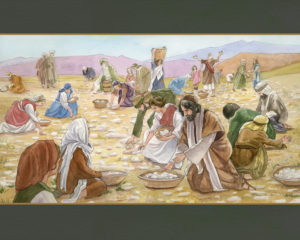 Ober wait, there’s even more. Avada you recall that the RBSO provided Munn for the Yiddin to eat in the Midbar. Says the heylige Toirah, the Munn fell each day anew and the Yiddin were required to collect their daily portion of Munn each morning. They had to consume the full portion each day, without leaving any leftovers for the next day. As expected not everyone followed the rules and says the heylige Toirah azoy (Shemois 16:20): “And people left over from it until the morning.” Says Rashi quoting the medrish (Tanchuma,Tetzaveh 10), who were the wisenheimers that disobeyed the Munn collections rules? None other than Doson and Aviram. In other words; they were associated with all troubled behavior.
Ober wait, there’s even more. Avada you recall that the RBSO provided Munn for the Yiddin to eat in the Midbar. Says the heylige Toirah, the Munn fell each day anew and the Yiddin were required to collect their daily portion of Munn each morning. They had to consume the full portion each day, without leaving any leftovers for the next day. As expected not everyone followed the rules and says the heylige Toirah azoy (Shemois 16:20): “And people left over from it until the morning.” Says Rashi quoting the medrish (Tanchuma,Tetzaveh 10), who were the wisenheimers that disobeyed the Munn collections rules? None other than Doson and Aviram. In other words; they were associated with all troubled behavior.
Wait, we’re not done yet: another medrish tells yet another tale; of course it could be emes, ver veyst. Moishe advised the Yiddin that munn would not fall on the heylige Shabbis, Doson and Aviram tried to trick the people into thinking that the munn had fallen on Shabbis. How? They scattered some on the ground at sunrise (just before the hashkomo minyan). Ober birds came and ate all the munn they had spread before the Yiddin woke up. Had the people seen the munn on Shabbis following Moishe’s clear memo advising that no munn would fall; it could have been disastrous and likely would have had a deleterious effect on Moishe’s credibility and leadership. Of course, the revolt did eventually happen as we will learn mamish just below and of course we will soon learn that these same troublemakers, Doson and Aviram, were not only involved but efsher led the charges. Nu, believe it or not, to show gratitude to the birds for eating the shabbis morning munn, some Yiddin have the minhag of putting out bread for the birds during the week of Parshas B’shalach. This is emes.
Doson and Aviram are also implicated in the meraglim (spies) caper. We are told that they were the ones who, during the episode with the spies, announced (Sh’lach 14:4) ‘Let us appoint a leader’. Says Rashi, they wanted a new god. And finally we get to our parsha where Doson and Aviram were the ones who stood up to Moishe, and who, in a display of unprecedented arrogance, shamelessly denigrated him. They were mamish shlecht! How bad? Says the Yalkut that whatever evil one can ascribe to them, one should. In fact the Oisvorfer blames them, his rebbe in yeshiva that flashed the shtekin, if you chap, which he tried to do and his prichei leader for all his woes.
Nu, we’re still left with two open questions. Ershtens why didn’t the RBSO eliminate these two clowns much earlier? And was Mitzrayim the land of milk and honey?
Nu, let’s see what some had to say. According to some, including the Rashbam and even Rav Ovadiah Yoseph, the RBSO only killed the non-believers. Seemingly, Doson and Aviram, though confirmed troublemakers, were believers in the RBSO. Believing can save one’s life, who knew?
On the other hand, says the Mikdash HaLevi (p.235-236) farkert (the opposite): they were mamish giferliche people. How bad? So bad, they did not merit having their death and punishment in obscurity. Their evil was so giferlich; they needed a more public demise. They had sunk so low during their lives, the RBSO saw fit to have them sink further, into the ground this time, and waited for Koirach to come along; they were buried together.
On the other hand, said the Levush Yoiseph (BiShalach page 77) azoy: Doson and Aviram were saved from death in Mitzrayim because they were not black and white. While they were evil in Mitzrayim, they did have the zichus (merit) of being the officers over other Yiddin and that they themselves received lashes rather than being the cause of lashes toward other Yiddin.
Efsher we can also kler that maybe Doson and Aviram were not the two characters we met back in Shemois. Maybe that Medrish has it wrong. And taka had that medrish been correct; the RBSO would not have waited some 60-70 years to punish them, ver veyst. Seemingly this pshat is just as plausible as are others. Moreover, we just don’t know. If the RBSO wanted us to meet them by name in Shemois, He would have introduced them. He didn’t! Who are we to question whey these two lived and others were struck down within minutes? Ver veyst?
Ober Raboyseyee, the answer you’re about to hear is mamish givaldig and even more givaldig for giferlich sinners like many of you are. Seemingly, the RBSO “extends His hand to sinners.” The RBSO has endless patience and waits for the wicked to repent. Even the worst of us can come back. All one needs is a sincere desire to do tshuva. For a repenter, the RBSO is prepared to split the sea all over again. Not only would the sea be split for him, but it would split “only” for him, exclusively for him. Could the news be any better?
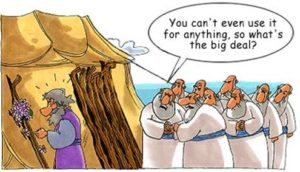 And the bottom line? In a few more weeks, the heylige Toirah (Bamidbar 21:9-11) will confirm their bad character traits. The Toirah itself, not Rashi and not the heylige Gemora or even the medrish, will, with some specificity, remind us about some of the trouble that these two guys caused and how their families died as a result. Says the Toirah: “… that’s the Doson and Aviram, appointees of the congregation, who incited the people against Moishe and Aharoin with Koirach’s group, when they rebelled against the RBSO. And the earth opened its mouth and swallowed them and Koirach, when the group was killed when the fire consumed the two hundred and fifty men, and they became a sign. But the children of Koirach didn’t die.” Shoin, case closed: Doson and Aviram are confirmed as being devoid of scruples. Whenever there was trouble, they were sure to be at the forefront.
And the bottom line? In a few more weeks, the heylige Toirah (Bamidbar 21:9-11) will confirm their bad character traits. The Toirah itself, not Rashi and not the heylige Gemora or even the medrish, will, with some specificity, remind us about some of the trouble that these two guys caused and how their families died as a result. Says the Toirah: “… that’s the Doson and Aviram, appointees of the congregation, who incited the people against Moishe and Aharoin with Koirach’s group, when they rebelled against the RBSO. And the earth opened its mouth and swallowed them and Koirach, when the group was killed when the fire consumed the two hundred and fifty men, and they became a sign. But the children of Koirach didn’t die.” Shoin, case closed: Doson and Aviram are confirmed as being devoid of scruples. Whenever there was trouble, they were sure to be at the forefront.
Ober that’s still weeks away. What happened this week? Shoin, let’s quickly cover the attempted coup. In their final act of defiance, this week, these two troublemakers will team up with Koirach who may have been not such a terrible person compared to them and lead a rebellion mamish against an older and compromised Moishe. They had several complaints. Among those they were upset about having been led out of Mitzrayim which they referred to as the “the good land” to the Midbar where the RBSO, following the meraglim caper, sentenced many to die. Together these two led the revolt in a ‘midbar-spring’ when they ganged up on Moishe and Aharoin. It was a mutiny mamish. Said they “Is it not enough that you have brought us up from a land flowing with milk and honey…” Milk and honey in Mitzrayim?
Ober doesn’t the heylige Toirah tell us that it’s the land of K’naan, the Promised Land, the land we call Israel, which was and is the land of milk and honey? Indeed it does. Where? All over the place. In fact, according to some, there are as many as 20 such mentions and expressions in the heylige Toirah. 19 of those refer to Israel as being the land of milk and honey and 1, this one utterance by Doson and Aviram, refers to Mitzrayim as flowing with milk and honey. And if you add others found in the Novee (Yishoishua, Yichezkel, Yirmiyohu and Yeshaya) the number will grow to over 25.
Avada, you recall Moishe’s encounter with the burning bush (Shemois 3:8) during which the RBSO said azoy: ‘And I shall go down to save them from the hand of Mitzrayim, and to bring them up from that land to a good and spacious land, to A LAND FLOWING WITH MILK AND HONEY….’ Who doesn’t recall such an encounter, if you chap?
Shtelt-zich-di-sheylo (the question arises), how could these two clowns now recall Mitzrayim, which was mamish a house of horrors, with such fondness? And if they did, why did the Yiddin listen? That being the case, what the hec were Doson and Aviram smoking when they suggested that Mitzrayim, where the Yiddin were nebech enslaved for 210 years, was the land of milk and honey? Were they thinking about the hot shiksa mydlich they were calling honey and efsher the milk they were trying to get off them, if you chap? It does seem that these two guys were nothing but a bunch of michutzofim (wisenheimers). Nu, efsher we can kler they were suffering from heat stroke over in the hot desert and became delusional, ver veyst. In every event, though bad guys, the RBSO kept giving them breaks. Their luck ran out this week.
A gittin Shabbis and a gittin Choidesh!
The Heylige Oisvorfer Ruv
Yitz Grossman
Source URL: https://oisvorfer.com/koirach-2017-cary-nc-danbury-ct-the-rbsos-patience/
